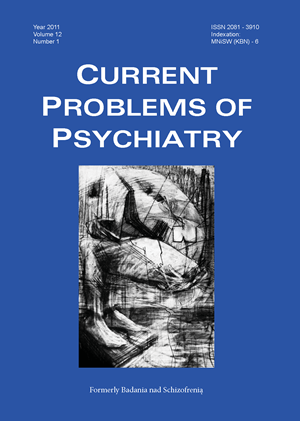The role of acetylocholinesterase inhibitors in the treatment of dementive syndromes
Keywords:
acetylocholinesterase inhibitors, dementive syndromeAbstract
Postępujący lub rzadziej utrwalony deficyt funkcji poznawczych jest podstawowym objawem klinicznym otępień. Charakteryzuje się on upośledzeniem zwłaszcza pamięci, ale także innych funkcji poznawczych, takich jak zdolności językowe, apraksją, agnozją oraz zaburzeniami orientacji przestrzennej. Postęp wiedzy w ostatnich latach umożliwił sformułowanie nowych zaleceń diagnostycznych i terapeutycznych dotyczących leczenia choroby Alzheimera i innych zespołów dementywnych. Mimo istnienia wielu kierunków badawczych w leczeniu otępień, w praktyce klinicznej zastosowanie mają 3 inhibitory AchE oraz antagonista receptorów NMDA-memantyna.Stosowanie tych leków nadal budzi kontrowersje i rodzi wiele pytań dotyczących właściwego momentu, w którym należy rozpocząć leczenie, skuteczności tych preparatów jak też możliwości zwiększenia ich efektywności. Nie ma obecnie jednoznacznych danych potwierdzających zasadność zastosowania tych preparatów w łagodnych zaburzeniach poznawczych (MCI, mild cognitive impairment), a wyniki badań dotyczących prewencyjnej roli inhibitorów acetylocholinesterazy w MCI są niejednoznaczne. Obecnie w celu poprawy efektywności leczenia musimy wziąć pod uwagę istnienie nowszych, bezpieczniejszych postaci leków oraz terapię łączoną. W poniższym artykule zaprezentowano najważniejsze informacje dotyczące inhibitorów acetylocholinesterazy i ich zastosowania w praktyce klinicznej.
References
1. Fratiglioni L., Grut M., Forsell Y., Viitanen M., Grafström M., Holmén K., Ericsson K., Bäckman L., Ahlbom A., Winblad B. Prevalence of Alzheimer;s disease and other dementias in an elderly urban population: relationship with age, sex and education. Neurology 1991; 41: 1886-1892.
2. Davies K.L., Maloney A.J. Selective loss of central cholinergic neurons in Alzheimer;s disease. Lancet, 1976; 2: 1403-1409.
3. Shapiro M. Plasticity, hipocampal place cells and cognitive maps. Arch. Neurol., 2001; 58: 874-881.
4. Francis P.T., Palmer A.M., Snape M., Wilcock G.K. The cholinergic hypothesis of Alzheimer’s disease: a review of progress. J. Neurol. Neurosurg. Psychiatry, 1999; 66: 137-147.
5. Aguglia E., Onor M.L., Saina M., Maso E. An open label comparative study of rivastigmine, donepezil and galantamine in a real world setting. Curr. Med. Res. Opin., 2004; 11: 1747-1752.
6. Pakrasi S., Mukaetowa-Ladinska E.B., McKeith I.G., O’Brien J.T. Clinical predictors of response to Acetyl Cholinesterase Inhibitors: experience from routine clinical use in Newcastle. Int. J. Geriatr. Psychiatry, 2003; 18 879-886.
7. Lemstra A., Eikelenboom P., van Gool W.A. The cholinergic deficiency, syndrome and its therapeutic implications. Gerontology, 2003; 49: 55-60.
8. Giacobini E. Cholinesterases: new roles in brain function and in Alzheimer’s disease. Neurochem. Res., 2003; 28: 515-522.
9. Gauthier S., Ballard C. Symptomatic treatment for dementia. In: Gauthier S, Ballard C. Management of dementia. 2nd Ed. New York, Lundbeck Institute; 2009, p. 73-86.
10. Winblad B., Kilander L., Erikson S. Minthon L., Båtsman S., Wetterholm A.L., Jansson-Blixt C., Haglund A. Severe Alzheimer’s disease Study Group. Donepezil in patients with severe Alzheimer’s disease: double-blind parallel-group, placebo controlled study. Lancet, 2006; 367: 1057-1065.
11. Wentrup A., Oertel W.H., Dodel R. Once-daily transdermal rivastigmine in the treatment of Alzheimer's disease. Drug Des. Devel. Ther., 2009; 6(2): 245-254.
12. Sadowsky C.H., Dengiz A., Olin J.T., Koumaras B., Meng X., Brannan S. US38 study group. Switching from donepezil tablets to rivastigmine transdermal patch in Alzheimer's disease. Am. J. Alzheimers Dis. Other Demen., 2009; 24(3): 267-275.
13. Cummings J.L. Use of cholinesterase inhibitors in clinical practice: evidence-based recommendations. Am. J. Geriatr. Psychiatry, 2003;11: 131-145.
14. Lefèvre G., Sedek G., Jhee S.S., Leibowitz M.T., Huang H.L., Enz A., Maton S., Ereshefsky L., Pommier F., Schmidli H., Appel- Dingemanse S. Pharmacokinetics and pharmacodynamics of the novel daily rivastigmine transdermal patch compared with twicedaily capsules in Alzheimer's disease patients. Clin. Pharmacol. Ther., 2008; 83(1): 106-114.
15. Imbimbo B.P. Pharmacodynamic-tolerability relationships of cholinesterase inhibitors for Alzheimer’s disease. CNS Drugs, 2001; 15: 375-390.
16. Winblad B., Grossberg G., Frölich L., Farlow M., Zechner S., Nagel J., Lane R. IDEAL: a 6-month, double-blind, placebo-controlled study of the first skin patch for Alzheimer disease. Neurology, 2007; 69(4 Suppl 1): S14-22.
17. Cummings J., Winblad B. A rivastigmine patch for the treatment of Alzheimer's disease and Parkinson's disease dementia. Expert Rev. Neurother., 2007; 7: 1457-1463.
18. Winblad B., Kawata A.K., Beusterien K.M., Thomas S.K., Wimo A., Lane R., Fillit H., Blesa R. Caregiver preference for rivastigmine patch relative to capsules for treatment of probable Alzheimer's disease. Int. J. Geriatr. Psychiatry, 2007; 22: 485-491.
19. Cummings J., Lefevre G., Small G., Appel-Dingemanse S. Pharmacokinetic rationale for the rivastigmine patch. Neurology, 2007; 69: S10-S13.
20. Tariot P.N., Farlow M.R., Grossberg G.T., Graham S.M., McDonald S., Gergel I. Memantine treatment in patients with moderate to severe Alzheimer disease already receiving donepezil: a randomized controlled trial. JAMA, 2004; 291: 317-324.
21. Raina P., Santaguida P., Ismaila A., Patterson C., Cowan D., Levine M., Booker L., Oremus M. Effectiveness of cholinesterase inhibitors and mementine for treating dementia: evidence review for a clinical practice guideline. Ann. Int. Med., 2008; 5: 379-397.
Downloads
Published
Issue
Section
License
Copyright (c) 2011 Authors

This work is licensed under a Creative Commons Attribution-NonCommercial-NoDerivatives 3.0 Unported License.


